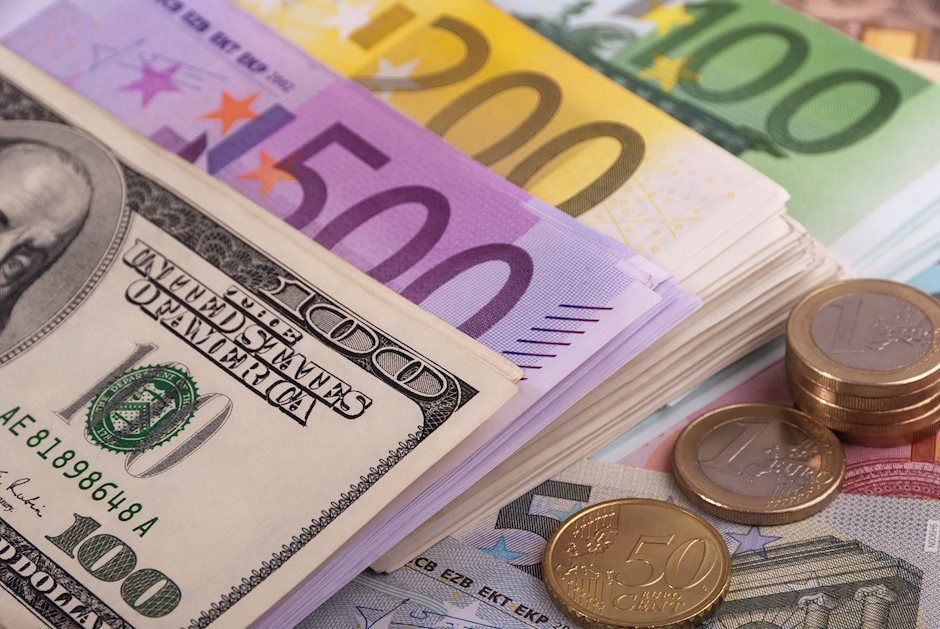EUR/USD remains on the defensive below 1.1050, all eyes on US NFP data
- EUR/USD struggles to gain ground around 1.1035 in Friday’s early Asian session.
- The US Services PMI came in better than expected in September.
- The cautious mood and rising bets of another ECB rate cut weigh on the Euro.

The EUR/USD pair remains on the defensive near 1.1035 amid the stronger Greenback during the early Asian session on Friday. The cautious mood in the markets ahead of the key US economic data weighs on the major pair. All eyes will be on the release of US employment data, which is due later on Friday.
The upbeat US Services Purchasing Managers Index (PMI) released on Thursday provides some support to the US Dollar (USD). The Services PMI climbed to 54.9 in September from 51.5 in August, exceeding the market forecast of 51.7, the Institute for Supply Management (ISM) showed.
Meanwhile, Initial Jobless Claims in the US rose by 6,000 to 225,000 in the week ending September 28. This figure followed the previous week's print of 219,000 (revised from 218,000) and came worse than the market expectation of 220,000.
Fed Chair Jerome Powell indicated this week that policymakers would likely stick with 25 basis points (bps) rate cuts going forward. The markets have priced in nearly 68.9% odds of a 25 bps Fed rate cut, while the chance of 50 bps reductions stands at 31.1%, according to the CME FedWatch Tool.
The US Nonfarm Payrolls (NFP) on Friday could offer some hints about the US interest rate path. The US economy is estimated to see 140K job additions in September, while the Unemployment Rate is projected to hold steady at 4.2%. If the jobs report showed a weaker-than-expected outcome, this could prompt the central bank to consider cutting rates deeper, which might exert some selling pressure on the USD.
Across the pond, the European Central Bank (ECB) policymakers continue to hint that another cut could be coming in the near future. This, in turn, might undermine the Euro (EUR) against the USD. Kyle Chapman, FX analyst at Ballinger Group, noted, "Policy is far too restrictive given the tough macro environment, and a switch to consecutive rate cuts seems to be a given now that disinflation is in its late stages.
Euro FAQs
The Euro is the currency for the 19 European Union countries that belong to the Eurozone. It is the second most heavily traded currency in the world behind the US Dollar. In 2022, it accounted for 31% of all foreign exchange transactions, with an average daily turnover of over $2.2 trillion a day. EUR/USD is the most heavily traded currency pair in the world, accounting for an estimated 30% off all transactions, followed by EUR/JPY (4%), EUR/GBP (3%) and EUR/AUD (2%).
The European Central Bank (ECB) in Frankfurt, Germany, is the reserve bank for the Eurozone. The ECB sets interest rates and manages monetary policy. The ECB’s primary mandate is to maintain price stability, which means either controlling inflation or stimulating growth. Its primary tool is the raising or lowering of interest rates. Relatively high interest rates – or the expectation of higher rates – will usually benefit the Euro and vice versa. The ECB Governing Council makes monetary policy decisions at meetings held eight times a year. Decisions are made by heads of the Eurozone national banks and six permanent members, including the President of the ECB, Christine Lagarde.
Eurozone inflation data, measured by the Harmonized Index of Consumer Prices (HICP), is an important econometric for the Euro. If inflation rises more than expected, especially if above the ECB’s 2% target, it obliges the ECB to raise interest rates to bring it back under control. Relatively high interest rates compared to its counterparts will usually benefit the Euro, as it makes the region more attractive as a place for global investors to park their money.
Data releases gauge the health of the economy and can impact on the Euro. Indicators such as GDP, Manufacturing and Services PMIs, employment, and consumer sentiment surveys can all influence the direction of the single currency. A strong economy is good for the Euro. Not only does it attract more foreign investment but it may encourage the ECB to put up interest rates, which will directly strengthen the Euro. Otherwise, if economic data is weak, the Euro is likely to fall. Economic data for the four largest economies in the euro area (Germany, France, Italy and Spain) are especially significant, as they account for 75% of the Eurozone’s economy.
Another significant data release for the Euro is the Trade Balance. This indicator measures the difference between what a country earns from its exports and what it spends on imports over a given period. If a country produces highly sought after exports then its currency will gain in value purely from the extra demand created from foreign buyers seeking to purchase these goods. Therefore, a positive net Trade Balance strengthens a currency and vice versa for a negative balance.
Author

Lallalit Srijandorn
FXStreet
Lallalit Srijandorn is a Parisian at heart. She has lived in France since 2019 and now becomes a digital entrepreneur based in Paris and Bangkok.

















